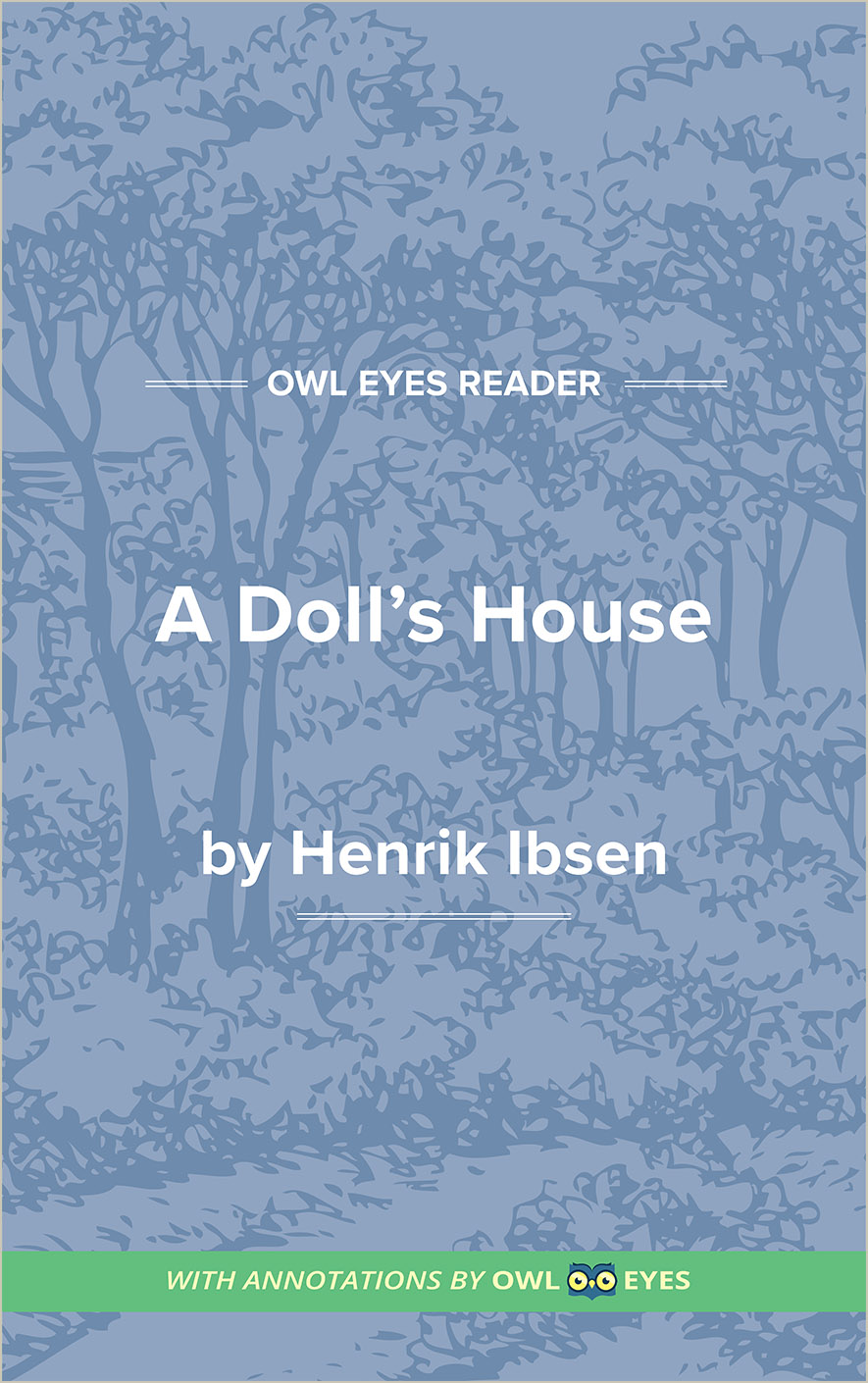Analysis Pages
Themes in A Doll's House
One of the most central themes of Ibsen’s A Doll’s House is the concept of women as possessions in marriage and society as a whole. The play’s title alludes to this theme—Nora is Torvald’s “doll,” not his equal. The play is concerned with how all of its characters, but especially women, are forced to keep up appearances in order to fit into society’s roles.
Not only must Nora be a doll, she must live in a doll-home, successfully convincing Torvald and their social world that both her marriage and household are perfectly happy and problem-free. Naturally, the unyielding expectations of society necessitate deceit as characters struggle to force their outward appearances into these unrealistic repressive standards. Just as social norms require deception on the part of all characters, non-inclusive and unjust laws elicit deception for the marginalized, forcing arguably “honorable” people to commit crimes or to keep secrets.
Themes Examples in A Doll's House:
Act I
🔒"Just think how a guilty man like that has to lie and play the hypocrite with every one, how he has to wear a mask in the presence of those near and dear to him, even before his own wife and children. And about the children—that is the most terrible part of it all, Nora...." See in text (Act I)
"Aha! so my obstinate little woman is obliged to get someone to come to her rescue?..." See in text (Act I)
"Does my little Nora acknowledge that at last? ..." See in text (Act I)
"I don't believe it. Is a daughter not to be allowed to spare her dying father anxiety and care? Is a wife not to be allowed to save her husband's life?..." See in text (Act I)
"My sons are growing up; for their sake I must try and win back as much respect as I can in the town...." See in text (Act I)
"[hiding the packet]. Hush! Hush! Hush! [HELMER comes out of his room, with his coat over his arm and his hat in his hand.]..." See in text (Act I)
"to know that he owed me anything! It would upset our mutual relations altogether; our beautiful happy home would no longer be what it is now...." See in text (Act I)
"You are proud..." See in text (Act I)
"For myself? Oh, I am sure I don't want anything...." See in text (Act I)
"I locked myself up..." See in text (Act I)
"You ought not to be so superior...." See in text (Act I)
"becomes selfish..." See in text (Act I)
"Hide the Christmas Tree carefully, Helen..." See in text (Act I)
"nice little dolly children..." See in text (Act I)
Act II
🔒"HELMER: My dear darling Nora, you are dancing as if your life depended on it. NORA: So it does...." See in text (Act II)
"And in every single family, in one way or another, some such inexorable retribution is being exacted—..." See in text (Act II)
"Because it is such a narrow-minded way of looking at things...." See in text (Act II)
"You are still very like a child in many things..." See in text (Act II)
"Tarantella..." See in text (Act II)
"Neapolitan fisher-girl..." See in text (Act II)
"had no other mother but me. ..." See in text (Act II)
Act III
🔒"HELMER: I would gladly work night and day for you, Nora—bear sorrow and want for your sake. But no man would sacrifice his honour for the one he loves. NORA: It is a thing hundreds of thousands of women have done...." See in text (Act III)
"but I find it impossible to convince myself that the law is right. ..." See in text (Act III)
"I believe that before all else I am a reasonable human being, just as you are—or, at all events, that I must try and become one...." See in text (Act III)
"Alas, Torvald, you are not the man to educate me into being a proper wife for you. ..." See in text (Act III)
"You have never loved me. You have only thought it pleasant to be in love with me...." See in text (Act III)
"we have never exchanged a word on any serious subject...." See in text (Act III)
"and she has in a way become both wife and child to him. So you shall be for me after this, my little scared, helpless darling. ..." See in text (Act III)
"Taking off my fancy dress...." See in text (Act III)
"You will still remain in my house, that is a matter of course...." See in text (Act III)
"Then it must have been the children—..." See in text (Act III)
"Do you know, you ought to embroider...." See in text (Act III)
"a black domino..." See in text (Act III)
"our home has been nothing but a playroom..." See in text (Act III)
"The most wonderful thing of all—?..." See in text (Act III)
"I have often wished that you might be threatened by some great danger, so that I might risk my life's blood, and everything, for your sake..." See in text (Act III)
"little Nora talking about scientific investigations!..." See in text (Act III)

